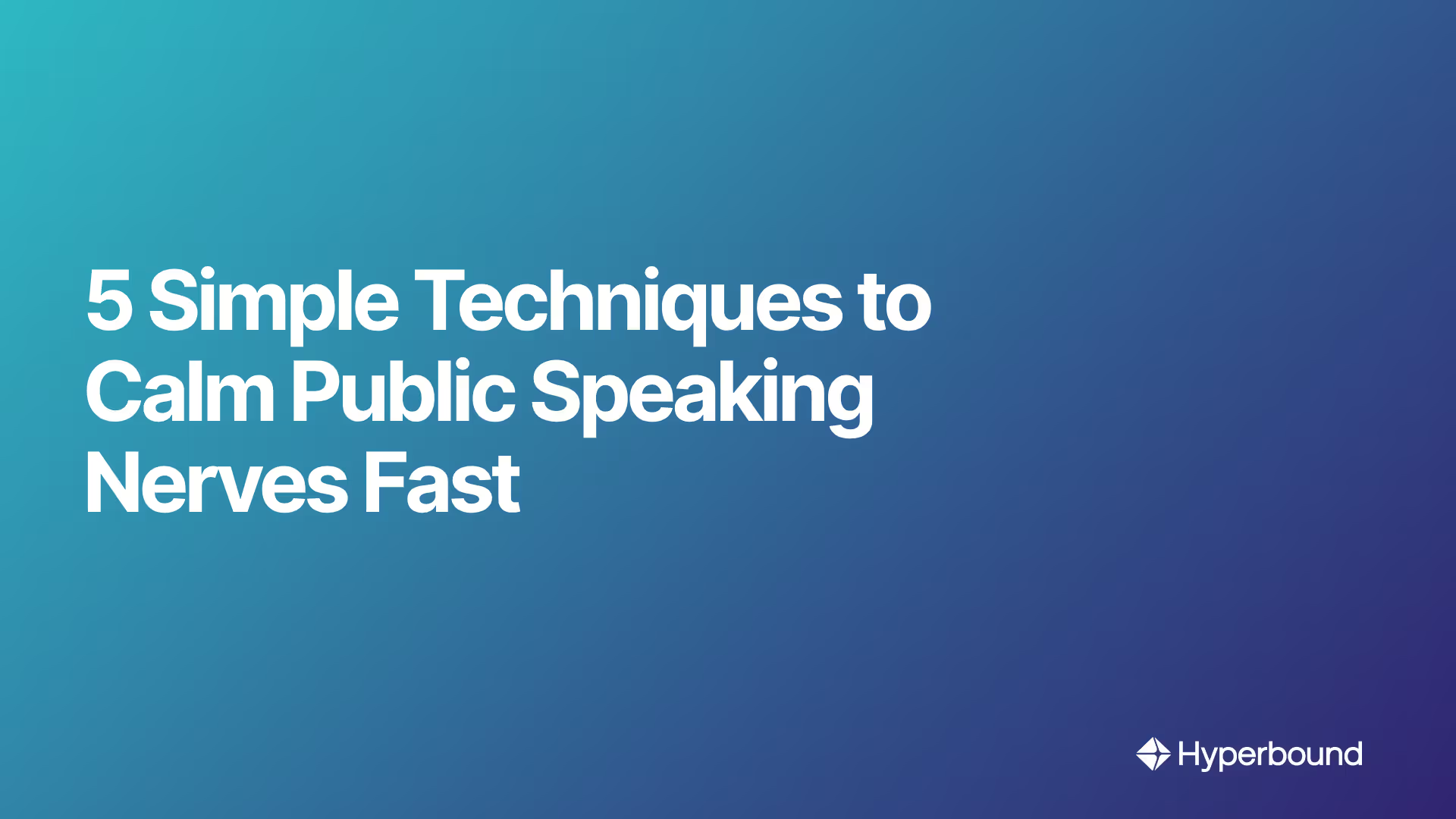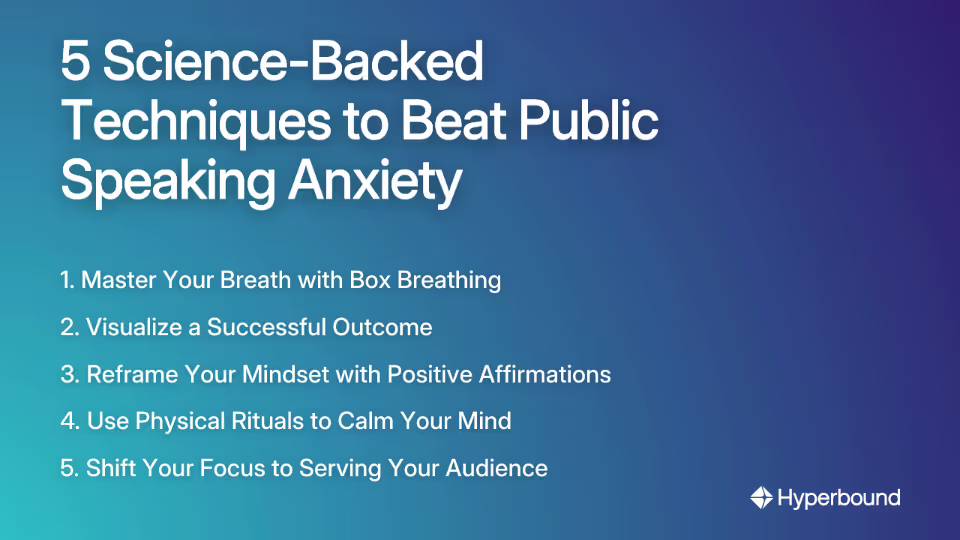
You're about to step on stage. Your heart is racing, palms are sweating, and suddenly your mind goes blank. That presentation you've been preparing for weeks? It seems to have vanished from your memory. The anxiety feels overwhelming, and you wonder if you'll ever get through this.
If this sounds familiar, you're not alone. Up to 75% of people experience glossophobia (the fear of public speaking), with some surveys suggesting many Americans would rather face death than give a speech. One Reddit user even noted, "74% of Americans prefer to die, yes actually die than speak in public."
The most frustrating part? Everyone says, "Just practice more!" But as many speakers have discovered, "the more I practice, the more I shake and get choked up. It's not for lack of trying!" This common advice often backfires for those experiencing severe anxiety.
What you need isn't more practice—it's fast-acting techniques to calm your nervous system right before you speak. These five science-backed methods can be implemented in minutes to reduce anxiety and help you deliver your message with confidence.

1. Master Your Breath with Box Breathing
When anxiety strikes, your breathing becomes shallow and rapid, triggering your body's fight-or-flight response. Box breathing (also known as sama vritti pranayama) directly counters this by activating your parasympathetic nervous system—your body's natural calming mechanism.
This technique is so effective that U.S. Navy SEALs use it to stay calm in high-pressure situations. According to the Cleveland Clinic, box breathing helps lower stress hormones and can even reduce blood pressure.
How to perform box breathing:
- Exhale completely through your mouth, emptying your lungs of air
- Inhale slowly through your nose for a count of 4
- Hold your breath for a count of 4
- Exhale slowly through your mouth for a count of 4
- Hold your breath again for a count of 4
- Repeat for 3-4 rounds (about 1 minute)
Perform this exercise right before you're called to speak. It's discreet enough to do while sitting in your chair, and powerful enough to noticeably reduce physical symptoms of anxiety.
For maximum effectiveness, practice box breathing daily in non-stressful situations so it becomes second nature when you need it most.
2. Visualize a Successful Outcome
Did you know your brain has difficulty differentiating between a vividly imagined event and a real one? This is why visualization is such a powerful tool for managing public speaking anxiety.
"Practice positive affirmations and visualize yourself giving your speech," advises one public speaking coach. This technique isn't just positive thinking—it's creating a mental blueprint for success.
According to Verywell Mind, visualization boosts self-confidence and enhances performance by training your brain for the actual event.
How to use visualization effectively:
- Find a quiet space 5-10 minutes before your presentation
- Close your eyes and take several deep breaths
- Engage all senses as you imagine the scenario:
- See yourself walking confidently to the stage
- Hear your voice projecting clearly and steadily
- Feel the weight of your notes or clicker in your hand
- Notice the audience engaged and responding positively
- Visualize the entire process, from walking on stage to receiving applause at the end
- Imagine overcoming challenges successfully—recovering smoothly from any mistake
To enhance this technique, visualize something you look forward to after the presentation. This shifts your focus from anxiety to a positive future reward.
3. Reframe Your Mindset with Positive Affirmations
"I feel like I'm lying to myself when I use positive affirmations," confessed one Reddit user. This sentiment is common—affirmations can feel insincere when anxiety is running high. But the goal isn't to convince yourself of falsehoods; it's to counteract the powerful negative thought loops that fuel anxiety.
Think of affirmations as training exercises for your brain. You're actively choosing to focus on empowering thoughts rather than catastrophic ones. Research shows that repeating positive statements can actually rewire neural pathways over time.
Effective affirmations for public speaking:
- "I am prepared and ready to share my knowledge."
- "I don't need to be perfect; I need to be authentic."
- "My audience wants me to succeed."
- "I can handle any question that comes my way."
- "Words and thoughts come effortlessly to me."
Choose one or two affirmations that resonate most with you. Repeat them silently or aloud in the minutes before your presentation. For maximum impact, pair them with visualization or box breathing.
According to Darling CEO, the effectiveness of affirmations increases when they're specific to the situation and spoken in the present tense.
4. Use Physical Rituals to Calm Your Mind
Anxiety isn't just mental—it's a full-body experience. These physical techniques provide an outlet for nervous energy and ground you in the present moment.
Quick physical techniques:
- Discreet energy release: Squeeze and release your toes inside your shoes or press your thumb and pointer finger together firmly. As suggested in the Stanford guide on presentation anxiety, this gives your nervous energy a physical outlet without being distracting.
- Hold something cold: Grasp a chilled water bottle before speaking. The cold sensation provides a grounding physical stimulus that can reduce symptoms like sweaty palms and blushing.
- Adopt a power stance: Before entering the room, stand with your feet shoulder-width apart, shoulders back, and head high for two minutes. This "power posing" has been shown to decrease cortisol (stress hormone) and increase confidence.
- Vocal warm-ups: Practice tongue twisters ("Peter Piper picked a peck of pickled peppers") to warm up your voice and shift focus from anxiety to the physical mechanics of speaking. This reduces crutch words (um, uh) during your actual presentation.
Many professional speakers develop personal rituals they perform before every presentation. These consistent actions become anchors for confidence, signaling to your brain that it's time to perform at your best.

5. Shift Your Focus to Serving Your Audience
"You're not trying to be perfect or put on a show," reminds one speaking coach, "but you're trying to convey a message and connect with your audience." This mindset shift can dramatically reduce anxiety.
When we're anxious about speaking, we're typically focused on ourselves—how we look, sound, and are being perceived. By redirecting your attention to serving your audience, you transform the experience from a performance (where you're being judged) to an act of sharing (where you're being helpful).
How to implement this technique:
- Remember why your message matters to the audience
- Identify 2-3 people in different parts of the room to make eye contact with
- Think of your presentation as a conversation, not a performance
- Have your opening lines memorized so you can focus on audience engagement from the start
- Embrace pauses as opportunities for your audience to absorb information, not as awkward silences
As the Mayo Clinic advises, "Focus on your material, not on your audience." When your attention is on delivering value rather than being evaluated, anxiety naturally decreases.
Additionally, adjust your pacing to ensure your message lands effectively. One Reddit user notes, "You may be rushing through it. Slow it down. Throw some pauses and deep breaths in there." Conscious pacing helps both you and your audience process information better.
When to Consider Additional Support
While these five techniques provide immediate relief, persistent anxiety may benefit from more structured support:
- Leverage AI-Powered Practice Tools: For those who want to practice privately and receive instant feedback, modern technology offers a powerful solution. AI coaching platforms like Hyperbound create a safe, repeatable environment to master high-stakes conversations and presentations. You can practice key messages, handle tough questions, and build confidence with an AI counterpart before facing a live audience.
- Join a Supportive Group: Organizations like Toastmasters offer a low-stakes environment to practice speaking and receive constructive peer feedback.
- Seek Professional Coaching: A one-on-one coach can provide personalized strategies and help you address specific challenges.
- Consult a Healthcare Provider: If anxiety is severe and debilitating, a healthcare provider can discuss treatment options. Some speakers find relief with prescribed medications like Inderal (a beta-blocker that reduces physical symptoms of anxiety) for important presentations.
The Path Forward
Remember that even the most accomplished presenters experience nerves. The difference is in how they manage those feelings. By implementing these five techniques—box breathing, visualization, positive affirmations, physical rituals, and shifting your focus—you can transform debilitating anxiety into manageable energy.
As you incorporate these strategies into your speaking routine, you'll develop greater empathy for yourself and your audience. Public speaking will become less about perfect performance and more about authentic storytelling and connection.
After your presentation, regardless of how it went, acknowledge your accomplishment. You faced a fear that many consider worse than death. That alone deserves celebration.
With practice and these science-backed techniques, you'll find yourself dreading presentations less and perhaps even looking forward to the opportunity to share your ideas with the world. Your career and personal growth need not be held hostage by speaking anxiety—these simple techniques can help you break free.
Remember, the goal isn't to eliminate nervousness entirely—it's to channel that energy into an engaging, impactful presentation that serves your audience while honoring your authentic voice.
Frequently Asked Questions
What is the fastest way to calm public speaking anxiety?
The fastest way to calm public speaking anxiety is to use a controlled breathing technique, such as box breathing. This method directly activates your body's relaxation response to counteract physical symptoms like a racing heart and shallow breath. By inhaling for four counts, holding for four, exhaling for four, and holding for four, you can significantly lower stress and regain composure in just a minute or two.
Why doesn't "just practice more" work for severe anxiety?
For individuals with severe glossophobia, practicing can increase anxiety because it repeatedly triggers the fight-or-flight response without providing tools to manage it. When practice sessions only reinforce feelings of panic and stress, it's more effective to first use calming techniques. Then, practice in a low-stakes environment, like with an AI coach or a supportive group, to build positive experiences.
How can I stop my voice and hands from shaking during a speech?
To stop your voice and hands from shaking, focus on regulating your breath and releasing nervous energy physically. Shaking is a result of adrenaline. Box breathing calms your nervous system, which helps stabilize your voice and hands. Additionally, performing vocal warm-ups before you speak and discreetly squeezing your toes can channel nervous energy away from your hands and voice.
What should I do if my mind goes blank on stage?
If your mind goes blank, take a deliberate pause, take a slow breath, and look at your notes or a friendly face in the audience. A pause feels much shorter to the audience than it does to you. Having your opening lines memorized can help you start strong, and focusing on the core message you want to share with the audience can help bring your thoughts back on track.
How can I make positive affirmations feel more genuine?
To make affirmations feel more genuine, choose statements that are believable and specific to your situation. Instead of a broad claim like, "I am a perfect speaker," try a more grounded affirmation like, "I am prepared and have valuable information to share." The goal isn't to lie to yourself but to interrupt the cycle of negative self-talk and focus on your strengths.
When should I seek more help than these quick techniques?
You should consider additional support if your public speaking anxiety is persistent, debilitating, or significantly impacting your career despite using these techniques. While these methods offer immediate relief, severe glossophobia may benefit from more structured approaches like joining Toastmasters, working with a professional coach, using AI-powered practice tools, or consulting a healthcare provider.

Book a demo with Hyperbound
.png)













